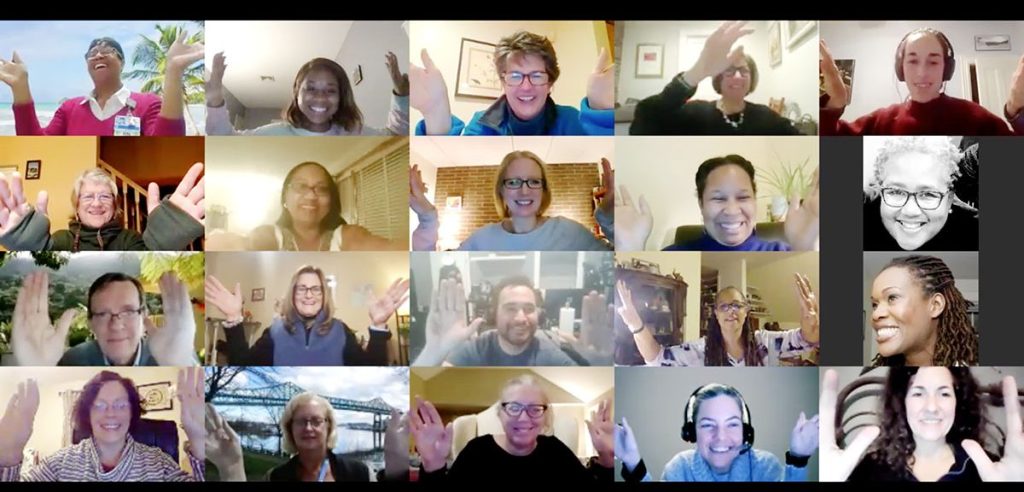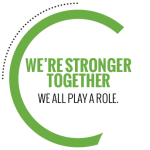In Push to Dismantle Inequitable Systems, Brigham COVID-19 Equity Response Team Becomes a Force for Change

Members of the Equity Response Team virtually “join hands” during a meeting last year.
Last April, a multidisciplinary group of equity leaders at the Brigham came together to develop strategies for addressing emerging equity issues in the pandemic and, when needed, escalating key concerns through the institution’s COVID-19 Incident Command structure.
With the support and engagement of leaders across the Brigham, the Brigham Health COVID-19 Equity, Diversity and Community Health Response Team became a driving force behind a number of initiatives during the height of the pandemic, including helping to establish community-based testing sites, advocate for equity in the state’s Crisis Standards of Care and conduct more than 100 COVID-19 information sessions for vulnerable populations of employees. As a reinvigorated racial justice movement swept the nation last summer, the group’s twice-monthly meetings also provided a haven for employees to express their concerns and organize actions to help dismantle structural racism.

Nearly one year after its formation, the Equity Response Team continues to meet and mobilize to address health equity issues at the Brigham and beyond. Most recently, the group has focused its efforts on equitable vaccine distribution, virtual care access and the dramatic rise of food and housing insecurity.
“We had a big opportunity to connect in an integrated way that hasn’t been done before,” said Cheryl Clark, MD, ScD, a hospitalist in Division of General Internal Medicine and Primary Care, health equity researcher in the Center for Community Health and Health Equity (CCHHE) and a leader of the Equity Response Team. “Clinical departments, community health, employee wellness, the diversity, equity and inclusion team — all of these different workstreams came together under one umbrella to work together on health equity.”
As the crisis evolves, the team remains energized and continues to advance its mission, Clark said.
“We have a very inclusive way of thinking about health equity, and, because of that, the community that continues this work is very cohesive,” she said. “We have a lot to accomplish in vaccine equity, and I think we also have the potential to provide support for burgeoning health equity efforts in the hospital, as well as the United Against Racism work that’s happening MGB-wide.”
‘Inequities Thrive in Silence’
Comprising approximately 90 members, the Equity Response Team formed in response to the recognition last year that local neighborhoods with large communities of color were experiencing significantly higher rates of infection, hospitalization and mortality from COVID-19. These communities also have experienced immense economic and social stress due to job loss, food insecurity and housing instability.
To address these issues, members have focused their work on five equity workstreams: community health, patient access, employee equity, health equity data, and proactive engagement and policy development on key community health issues.
“This group has been a voice and a force for the community — patients, staff and those outside of the hospital walls,” said Tracy Sylven, director of Community Health & Wellness at BWFH and a leader of the team’s community health workstream. “We helped to drive the equity agenda and need to the forefront of the institution during this time of crisis, including the pandemic and the racial inequality and protests we saw during the past year. The group, with the variety of workstreams and leads, has a voice across many aspects of the institution and helps to incorporate equity into the planning and process of work.”

RonAsia Rouse, MPH, project manager for the team, said the group’s diverse makeup sparks innovation and inspires progress.
“The Equity Response team offers a space for employees to collaborate and have their ideas and opinions heard in a way that is unlike any other meetings I’ve been a part of,” said Rouse, who also serves as program manager for Health Equity in the CCHHE. “Our members include clinicians, researchers and administrators, and having the ability to get everyone’s direct feedback and input on equity-focused topics has propelled projects and strategies that otherwise may not have been thought of or initiated.”
Michelle Keenan, senior director for Health Equity and Social Innovation in the CCHHE, agreed.
“What I have valued the most is that it is a multiracial, multidisciplinary group with a deep commitment to be the change we want to see in the world,” Keenan said. “As we have built our equity response to COVID, we have also built trust and understanding among staff. Inequities thrive in silence, and what has been most important is breaking this silence and taking collective action.”
‘We Know the Goal’
In the realm of community health, the group worked closely the Ambulatory Services team, led by Kelly Fanning, MBA, vice president of Ambulatory Services, and leaders from Brookside Community Health Center and Southern Jamaica Plain Health Center to support testing sites in four Boston neighborhoods. At these sites, staff conducted approximately 19,000 COVID-19 tests, distributed over 12,000 food boxes and 18,700-plus hot meals, handed out more than 20,000 care kits and performed about 15,000 social-determinants-of-health screenings.
In the area of patient access, members created a virtual care equity committee and advocated along with Interpreter Services leaders for increasing access to iPads to better support patients who communicate in languages other than English. In an effort led by Bernie Jones, EdM, vice president of Public Policy, and Wanda McClain, MPA, vice president of Community Health and Health Equity, and supported by Equity Response Team members, the group reached out to state lawmakers to advocate for an eviction moratorium and developed resources to support patients facing eviction.
“We know the goal — breaking down unequal systems, not people,” Jacqueline Rodriguez-Louis, MPH, M.Ed., a member of the Equity Response Team and programs leader for Community Outreach at the Partners Asthma Center in the Division of Pulmonary and Critical Care Medicine. “That’s what this group endeavors to do. Together, we are making a real and measurable difference in the organization and in the community we serve. This work is not only rewarding, but it is also soul-healing for me as a person of color during this incredibly difficult time.”
The team has also worked in close coordination with colleagues across Mass General Brigham (MGB). More broadly, MGB has led a systemwide commitment to incorporate an equity lens into every aspect of pandemic response and other initiatives, including the United Against Racism campaign.
“I’m just so excited by the work everyone has done,” said Clark, who also serves as director of Health Equity Research and Intervention in the CCHHE and a multi-principal investigator for the All of Us Research Program. “Those of us who are engaged in health equity work, including health equity research, understand this is a multidisciplinary proposition. It has been really rewarding to be able to operationalize our workstreams and build partnerships to create an infrastructure where that kind of multidisciplinary, systemwide work can happen.”
Finding Community amid ‘the Crisis of Our Time’
Contributing to these efforts has been an empowering experience, especially during such an uncertain time, say the team’s members and leaders.

“When this crisis hit and research paused, I thought it was important to ‘redeploy’ myself and raise my hand to guide these efforts,” Clark said. “It really is the crisis of our time.”
Rodriguez-Louis said the team’s regular meetings were an essential source of support after the killings of Ahmaud Arbery, Breonna Taylor and George Floyd.
“This group has been a lifeline,” she said. “Our meetings have allowed us to put our feelings someplace safe. We cry together, scream when we need to and put our hands to work.”
Christin Price, MD, program director of Medicaid ACO for Brigham Care Strategies & Innovation, who led several of the team’s community health-related initiatives, said being part of the group has been both professionally and personally rewarding.
“For me, the greatest part of this experience was the opportunity to participate in work that I otherwise would perhaps not have the opportunity to be involved in, such as being site lead at the new testing site or being a part of the vaccine trial group,” Price said. “The other part has been being able to work closely with colleagues across Brigham that I had not known or not worked closely with before. I have made very close connections with new colleagues.”
The Brigham Health COVID-19 Equity, Diversity and Community Health Response Team meets virtually twice a month, Thursdays, 5–6:15 p.m. All members of the Brigham Health community and MGB system are welcome to attend. To learn more or become a member, contact covid19equity@bwh.harvard.edu.

Leave a Reply